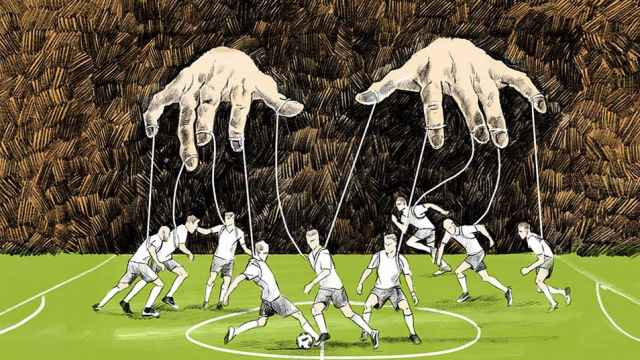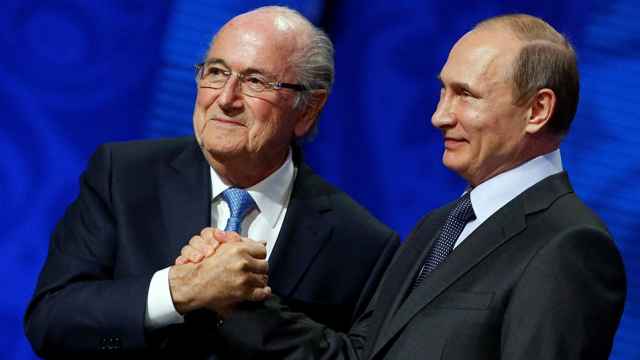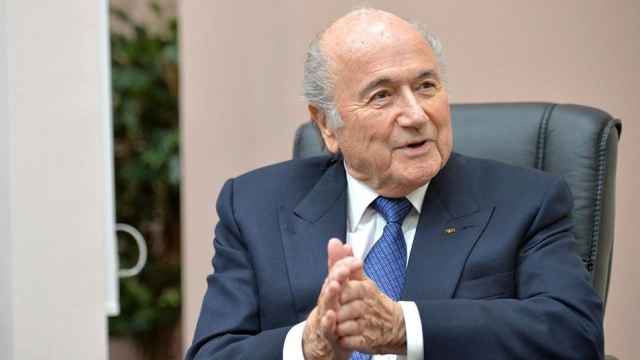It’s World Cup time, and suddenly everyone is an expert on Russia — and what awaits visiting fans. Mafia “honey traps,” sneaky spies, salivating terrorists, vicious hooligans; it all sounds quite scary. Yet these warnings say more about how the West looks at Russia than the reality on the ground.
The British press has, for example, run warnings that Russian gangsters might use “gorgeous Russian girls” to blackmail fans or even influence players. Mikk Marran, head of the Estonian Foreign Intelligence Service, went further, suggesting that Russia’s attractive intelligence agents are being groomed for this purpose. And while “it doesn’t mean every fan is a target… high-level officials visiting Russia might be possible targets."
Kompromat — compromising information — has been a staple of Russian intelligence activities (and not only theirs), but blackmail is one of the hardest kinds of criminal gambit to carry through, especially transnationally. For the overwhelming majority of fans, the risk is minimal.
This is not least because it is clear that for Putin, this is a prestige project intended to rebuild Russia’s depleted stocks of soft power. The Kremlin wants the World Cup to go smoothly. As with the Sochi Winter Olympics, the word has been put out to the country’s godfathers that it will be very displeased if visitors’ experiences are soured.
As well as being able to enforce a degree of security through its informal authority, the government is going to deploy a massive security operation to try to ensure that threats from jihadist terrorists and violent football hooligans are as controlled as possible.
This is a state with formidable security assets at its disposal. Much of their time may be wasted dispersing anti-government protests, shaking down innocent travelers from the North Caucasus and eavesdropping on opposition leaders’ phone calls. But for a month this summer, they will instead be devoted to ensuring that Putin’s football party goes smoothly.
Of course, none of this guarantees a perfect or positive outcome. Electronic devices, from phones to laptops, will certainly be snooped through by Russia’s spooks. Terrorism, while still mercifully rare, is always a risk in today’s world of internet-radicalized “lone wolves.” Even the largest police operations cannot prevent every brawl or deter the kind of overt racism and homophobia that are, regrettably, part of Russian football culture.
This is hardly unique, though. The scale and tone of the coverage and warnings — only likely to escalate as the games draw closer — say a good deal about how the West views Russia, as well as the impact of Putin’s increasingly aggressive geopolitical campaign to assert his country’s status as a great power.
Constrained by the very real limits of Russian economic and even military strength, but liberated by the divisions and often timidity of the West, Putin has unleashed a campaign of disinformation, subversion and intimidation. He does not appear to expect to win friends, but instead, like a global bully, wants to look too formidable, too unpredictable, too dangerous to ignore. His hope is that this persuades enough of the West that it has to make a deal with him and accept his terms.
This has terrible long-term costs and risks, though. Putin risks making Russia into an international pariah, betraying many Russians’ hopes that they can find a peaceful place in the global community.
The readiness of Western commentators and politicians to portray Russia as an unmitigated hotbed of hostility and intrigue — ignoring the very real positive aspects of the country and its culture — is not some cynical Western plot, as the more unhinged Russian propagandists claim. Rather, it is largely a depressing byproduct of a campaign of deliberate destabilization. Hopes that a month of football can dispel this miasma seem pretty unrealistic.
Mark Galeotti is a senior research fellow at the Institute of International Relations Prague and the author of “The Vory: Russia’s super mafia.” The views and opinions expressed in opinion pieces do not necessarily reflect the position of The Moscow Times.
A Message from The Moscow Times:
Dear readers,
We are facing unprecedented challenges. Russia's Prosecutor General's Office has designated The Moscow Times as an "undesirable" organization, criminalizing our work and putting our staff at risk of prosecution. This follows our earlier unjust labeling as a "foreign agent."
These actions are direct attempts to silence independent journalism in Russia. The authorities claim our work "discredits the decisions of the Russian leadership." We see things differently: we strive to provide accurate, unbiased reporting on Russia.
We, the journalists of The Moscow Times, refuse to be silenced. But to continue our work, we need your help.
Your support, no matter how small, makes a world of difference. If you can, please support us monthly starting from just $2. It's quick to set up, and every contribution makes a significant impact.
By supporting The Moscow Times, you're defending open, independent journalism in the face of repression. Thank you for standing with us.
Remind me later.








